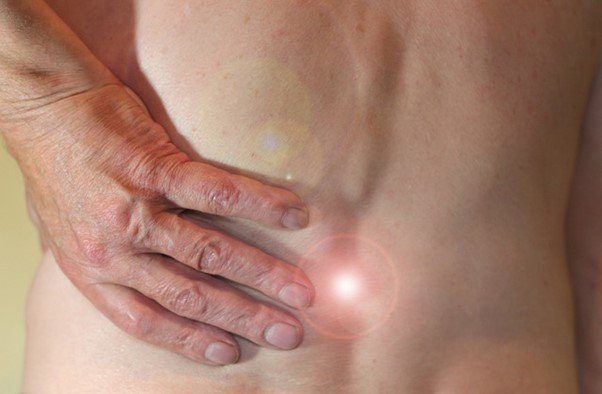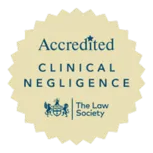What is Cauda Equina Syndrome?
Cauda equina syndrome is considered a medical emergency and it requires immediate intervention to prevent permanent damage to the nerves and lower body. In worst cases, it can cause permanent paralysis and incontinence.
It can be caused by a herniated disc, spinal tumour, spinal infection, or trauma to the lower back.
The symptoms of CES can be sudden and severe, so obtaining early diagnosis and treatment is crucial. If you experience any of these signs, you should seek medical help immediately. If the condition is not treated quickly enough, the symptoms of pain, weakness, and incontinence can be more severe and long-lasting.
While it is a very serious condition, the symptoms of back pain and numbness can be difficult to demonstrate to GPs and doctors. If cauda equina syndrome is not considered when you present your symptoms, the missed diagnosis could lead to delayed treatment and worsening of symptoms. This can have devastating effects, as the optimum window for surgery is within 48 hours.
When it comes to getting a diagnosis of CES, the conversation between the patient and healthcare professional can be difficult. The facts are often disputed, with both sides disagreeing. This is frustrating for the patient as it is not a case of being right or wrong – it is the difference between receiving proper treatment and continuing to suffer with painful symptoms.
When debating the existence of the syndrome, each side’s expert will find support for their point of view. This is why it’s vitally important to have a specialist Medical Negligence Lawyer acting on your behalf.
A specialist in this area of law can arrange for you to be assessed by a wide variety of independent medical experts. With their specialist knowledge, they can compile detailed reports on your condition and give their professional views on the treatment you were given.
We have a trusted network of independent medical experts, including physiotherapists, psychologists, occupational therapists, and urologists, who can help prove that you received substandard medical care, and that this directly caused the health problems you’ve had since.
With this evidence, we can negotiate a fair compensation settlement that meets your needs, both now and in the future. A settlement can be a lifeline in helping you manage your condition so you can live a happy and fulfilling life.
Contact our specialist Medical Negligence Solicitors for a free claims assessment and we’ll be happy to discuss the details of your situation with you. Our friendly, supportive team of specialists can advise if you have a good chance of claiming compensation, and can discuss different funding options such as No Win, No Fee.
Proving Medical Negligence
One of the key factors in proving medical negligence is to accurate establish when your Cauda Equina symptoms worsened to become the ‘red flag’ signs that doctors look for.
This is a major battleground in a Cauda Equina compensation claim, as it’s unlikely that the doctor or nurse you saw wrote down everything you said, or they did at the time.
As Cauda Equina Syndrome is much rarer than lower back pain or difficulties in urinating or defecating, it’s much less commonly seen by clinicians, and this can lead to two big problems:
- Not considering all of your symptoms objectively, so they jump to the wrong conclusion
- Not believing that they would get it wrong, and so not reconsidering their initial diagnosis
- Another problem is “groupthink”, with medical staff not wanting to challenge senior clinicians. And then during the case, another false preconception can appear, when the clinician under scrutiny doesn’t want to accept that they were wrong.

Two Versions of Events
Because of these preconceptions, clinicians often remember the same events very differently to you, so if a case has to be settled in Court, the judge has to choose between your evidence and your clinicians’.
The Courts understand that the human memory isn’t perfect and look to earlier cases, not necessarily Personal Injury Claims, for guidance on how people remember things. At the same time, medical records can be seen as the only “objective” record of what happened when the possibility of Cauda Equina Syndrome was being considered.
Even where these records appear incomplete in important respects, the clinicians’ legal team will often not accept any fact which isn’t clearly stated in your medical records.
This problem repeats itself for every disputed fact in your case because no fact is accepted as true unless it’s clearly supported by a corresponding contemporaneous document.
Expert Medical Evidence Can Make the Difference
The more ambiguity there is in the factual evidence in your case, the greater the disagreement between each side’s experts. So your Medical Negligence Solicitor must use all their skill and expertise of Cauda Equina cases to work with you and minimise this.
That’s one reason why we may have to arrange more than one medical assessment for you, as we may need a wide range of evidence from different specialists to prove that mistakes were made with your treatment. It can be a complex process, but it is worth it to fight your case of medical negligence.
We have a strong track record of success in cases like this. For instance, we recently helped a lady in her late 60s access treatment including CBT and physiotherapy, as well as specialist aids, equipment and services, after medical errors left her with serious mobility problems and a loss of bladder and bowel function.
To win the case, we used our expertise in Cauda Equina claims to assemble compelling evidence, using reports from a physiotherapist, a consultant orthopaedic spinal surgeon, a psychologist, a urologist and a care/occupational therapy expert, to prove that medical negligence occurred.
With this evidence, we were able to negotiate a settlement with the hospital trust responsible and arrange for her to get the care, support and rehabilitation she needed.
If you are suffering with long-term repercussions of cauda equina syndrome due to missed opportunities by medical staff, we can help you too.
How Simpson Millar Can Help
Simpson Millar have a strong team of experienced, friendly, and approachable Cauda Equina Solicitors, who will try everything they can to make sure your case is dealt with fairly and quickly. You can count on us to make sure; you’re kept notified of the progression of your claim at each step.
We work on a No Win, No Fee basis for medical negligence claims. This means, there is no fee to pay unless your claim is successful. So you can pursue your claim without financial worry or stress.
Our expertise in this matter spans several years of client compensation wins, and we are well versed in the laws that concern this matter.
We don’t want to confuse our clients with legal jargon. Instead, we’ll lay out all your options in the simplest way, so you can make an informed decision on how to pursue your Cauda Equina claim.
Get in touch with us today, and we’ll be able to get started on discussing the issues surrounding your Cauda Equina Claim, and how we can work together to put your medical evidence together. To get started, call us on 0800 260 5010 or you may fill in an online form and one of our people will get back to you.







